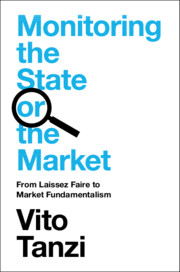Book contents
- Monitoring the State or the Market
- Monitoring the State or the Market
- Copyright page
- Contents
- Preface
- Acknowledgments
- Part I The Period until the Great Depression
- 1 Introduction
- 2 Early Views on the Economic Role of the State
- 3 Laissez Faire and the Industrial Revolution
- 4 The Beginning of Economic Reforms
- 5 On Resource Allocation, Optimality, and Equity
- 6 Beginning of Changes in the Activities of Governments
- 7 Toward Larger Government Roles
- Part II From Laissez Faire to Welfare States: 1930 to 1970
- Part III The Period after the 1970s
- References
- Index
6 - Beginning of Changes in the Activities of Governments
from Part I - The Period until the Great Depression
Published online by Cambridge University Press: 07 December 2023
- Monitoring the State or the Market
- Monitoring the State or the Market
- Copyright page
- Contents
- Preface
- Acknowledgments
- Part I The Period until the Great Depression
- 1 Introduction
- 2 Early Views on the Economic Role of the State
- 3 Laissez Faire and the Industrial Revolution
- 4 The Beginning of Economic Reforms
- 5 On Resource Allocation, Optimality, and Equity
- 6 Beginning of Changes in the Activities of Governments
- 7 Toward Larger Government Roles
- Part II From Laissez Faire to Welfare States: 1930 to 1970
- Part III The Period after the 1970s
- References
- Index
Summary
The Industrial revolution was producing many new and cheaper goods. The Bismarck’s reforms spread and started to impact other countries. Tax levels started to rise. Adolf Wagner’s writing was having some impact on economists and policymakers. The Papal Encyclical Letter, Rerum Novarum, that called for better treatment of workers, while accepting that incomes could not be equal in a marker economy, also had some impact. These and other developments started to change the world that had existed in the nineteenth century, leading to policy changes, such as control of monopolies, more use of income taxes, more controls of money supply, and some creation of basic safety nets. The United States had become much more important by this time and it would play a growing role in the world. Governments would play larger economic roles in the twentieth century.
Information
- Type
- Chapter
- Information
- Monitoring the State or the MarketFrom Laissez Faire to Market Fundamentalism, pp. 34 - 40Publisher: Cambridge University PressPrint publication year: 2023
